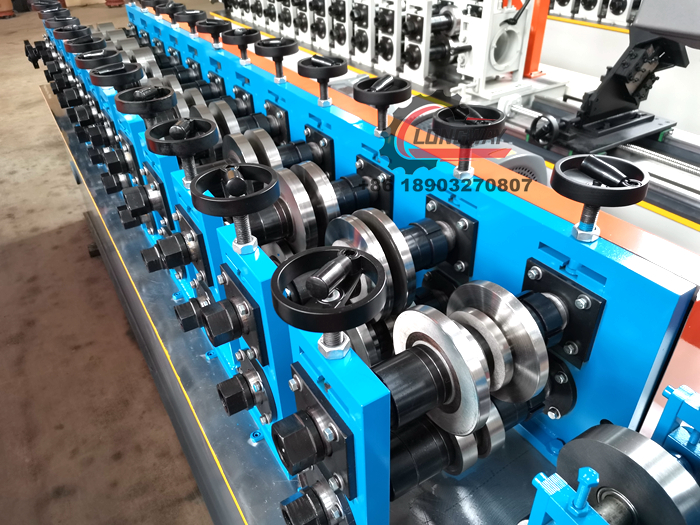corrugated steel sheet roll forming machine
Corrugated Steel Sheet Roll Forming Machine An Overview
In the modern construction and manufacturing industries, the demand for durable, efficient, and cost-effective building materials is ever-growing. One such material that has gained immense popularity is corrugated steel sheets, primarily due to their strength, versatility, and aesthetic appeal. The production of these sheets would not be feasible without the use of advanced machinery, specifically the corrugated steel sheet roll forming machine.
Understanding the Roll Forming Process
Roll forming is a continuous bending operation in which a long strip of metal, such as steel, is passed through consecutive sets of rollers to create a desired cross-sectional profile. The process is efficient and allows for high-speed production, making it ideal for manufacturing corrugated steel sheets. The machines work by gradually shaping the strip into the desired corrugated profile, which not only increases the strength of the material but also provides aesthetic value.
The corrugation process enhances the structural integrity of the steel sheets, allowing them to withstand environmental challenges such as wind and rain, making them suitable for roofing, siding, and other applications in both residential and commercial construction.
Features of the Corrugated Steel Sheet Roll Forming Machine
1. Durability and Efficiency A well-built corrugated steel sheet roll forming machine is designed for longevity and consistent performance. These machines are typically constructed from high-quality materials, which ensure they can operate efficiently over long periods without significant wear.
2. Customizability One of the standout features of modern roll forming machines is their ability to produce a variety of profiles tailored to customer specifications. Operators can easily adjust the machine settings to create different corrugation heights, widths, and shapes, accommodating specific project needs.
3. Automation and Control Many contemporary machines incorporate advanced control systems that improve precision and reduce labor costs. Automated features can include programmable logic controllers (PLCs), making it easier for operators to manage the entire production process from a control panel.
4. Material Versatility While primarily used for steel sheets, these machines can also process a variety of other materials, including aluminum and other alloys. This versatility expands the applicability of roll forming in diverse industries such as automotive, construction, and manufacturing.
corrugated steel sheet roll forming machine

5. Compact Design Many modern corrugated steel sheet roll forming machines are designed to occupy minimal floor space while still offering high production capacity. This is particularly beneficial for manufacturers looking to optimize their production lines without compromising on efficiency.
Applications of Corrugated Steel Sheets
Corrugated steel sheets produced by roll forming machines find applications in a myriad of areas. Some notable uses include
- Roofing Systems Their strength and durability make corrugated steel sheets an excellent choice for roofing in both industrial and residential settings. - Wall Paneling The aesthetic appeal and structural advantages of corrugated sheets make them popular for exterior wall cladding.
- Storage Solutions The sheets are widely used to construct storage facilities, where they provide security against environmental factors.
- Transportation They are also utilized in manufacturing transportation solutions such as truck and trailer sides and flooring.
The Future of Corrugated Steel Sheet Roll Forming Machines
As technology advances, the corrugated steel sheet roll forming machines are set to evolve further. Innovations in automation, material handling, and digital integration will streamline the production process even more. Additionally, as sustainable practices become paramount in manufacturing, these machines may also adapt by incorporating eco-friendly technologies, thus reducing waste and energy consumption during production.
Conclusion
The corrugated steel sheet roll forming machine is a vital component in the manufacturing sector, providing a reliable solution for producing strong and versatile materials that meet the growing demands of various industries. With technological advancements continually emerging, the future of roll forming machines looks promising, ensuring that they will remain an integral part of construction and manufacturing processes for years to come. The ease of operation, coupled with the ability to customize production to meet specific needs, provides a competitive advantage for manufacturers in a rapidly evolving market.
-
Roof Panel Machines: Buying Guide, Types, and PricingNewsJul.04, 2025
-
Purlin Machines: Types, Features, and Pricing GuideNewsJul.04, 2025
-
Metal Embossing Machines: Types, Applications, and Buying GuideNewsJul.04, 2025
-
Gutter Machines: Features, Types, and Cost BreakdownNewsJul.04, 2025
-
Cut to Length Line: Overview, Equipment, and Buying GuideNewsJul.04, 2025
-
Auto Stacker: Features, Applications, and Cost BreakdownNewsJul.04, 2025
-
Top Drywall Profile Machine Models for SaleNewsJun.05, 2025








